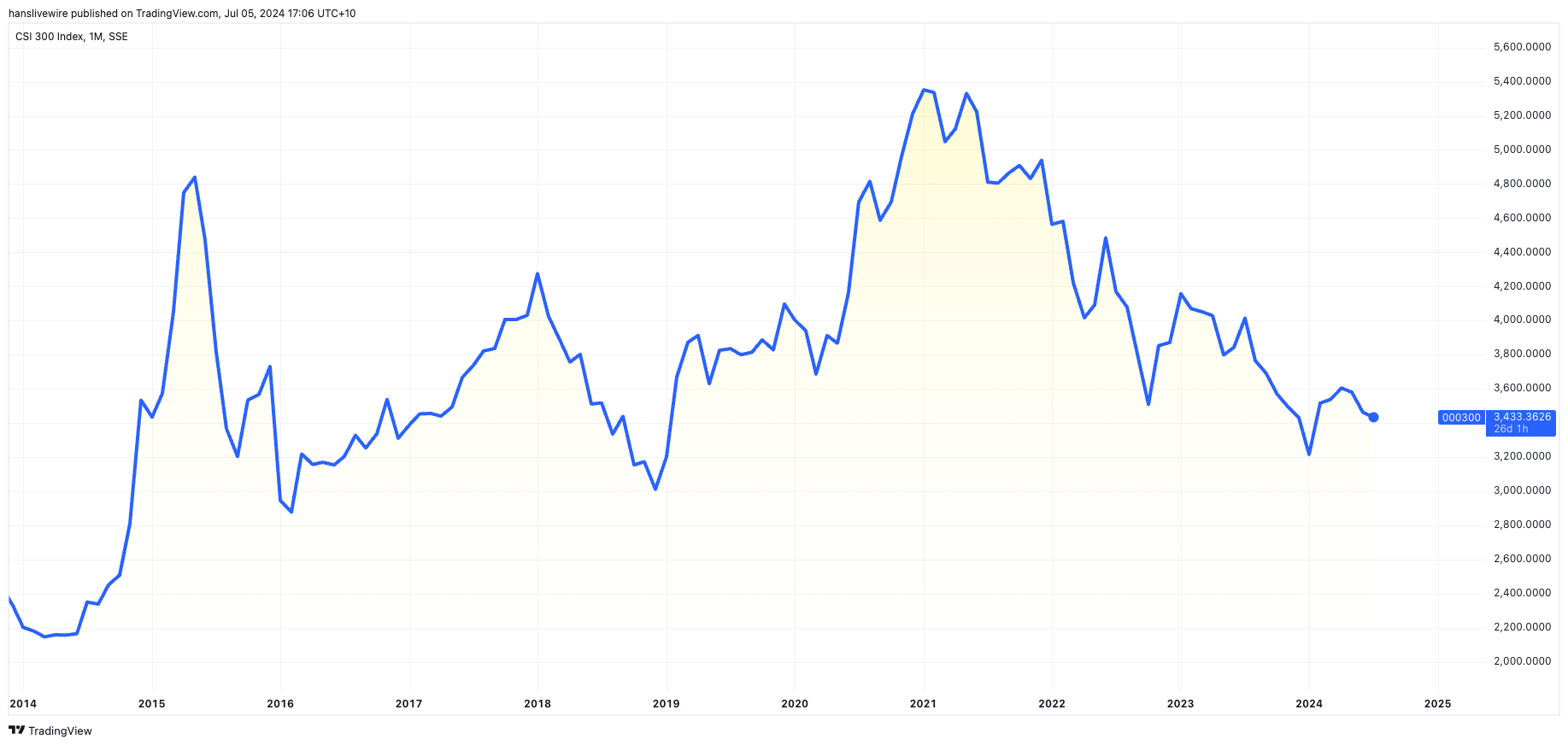Are these stocks the ultimate "deep value" opportunity?
This interview was taped on Friday 5 July 2024.
10 years ago, China was the top destination for foreign direct investment. Everyone wanted a slice of an economic engine that was firing on all cylinders. The "world's largest factory", as Investopedia calls it, had a big manufacturing economy and an emerging services economy.
Between 1990 and 2010, Australian exports from China grew from a measly 2% to 24% in that time. China became Australia's largest import partner in 2008 - and from there, our relationship with China became the talk of the town.
But while China's economy fired on all cylinders, the same could not be said for the stock market. The CSI 300 is sitting back at February 2019 levels and the index's attempts to power on when it hits fresh highs have been uninspiring.

But while the stories around extremely cheap stock valuations still exist, this time is very different to 2019. China is now dealing with several structural challenges, from a collapse in consumer spending to a housing crisis and burgeoning government debt. It's become such a problem that some investors believe the country is "uninvestable".
One person who disagrees with that sentiment is Anthony Srom, Fidelity International's stock-picking guru in Asia and PM of the Fidelity Asia Fund (Fidelity Asia Active ETF). In this episode of The Pitch, Srom tells us about his views on China and where he's finding opportunities in today's Tiger Economy.
Edited Transcript
Give us a sense of how China has changed - and the challenges it now faces.
Srom: There are a fair few structural challenges they face. I think if we were to sum it up into why Chinese GDP growth was so strong before that period that you are mentioning. They very much had a machine in place that generated very strong credit growth in China. So foreign direct investment [meant] positive money [was] coming in, trade surplus [meant] money coming into its capital account. So investors like myself who are managing portfolios, money coming in [meant the] PBOC takes that money in US dollars and sterilises it. So basically giving Renminbi to the local companies and then buying US treasuries with those dollars so that the local money supply of Renminbi keeps growing and growing and circulates in what is a relatively closed economy or closed capital account. So you had fantastic price growth in assets in, for example, property, the stock market from time to time, and solid GDP growth. But that machine by and large ceased about eight years ago.
So if you look at the EPS for the Chinese market in Renminbi terms, it's basically been flat for the last eight years. Companies nowadays, it's flat to negative FDI, so money coming out of China, trade surplus is still there. The capital account, I would say is deteriorating. So that machine that was generating a lot of credit growth and GDP growth as a result in China has gone into reverse. And I think that's one of the largest structural challenges they have to deal with besides things like demographics, the debt within the economy, lack of productivity, growth, et cetera.
Are the best days for Chinese stocks behind us?
Srom: Well, I think it's a really interesting question in the sense that stock market returns don't necessarily correlate with GDP growth or returns. No matter how much investors want to focus on that, they're two distinct things. So that's the first thing to bear in mind for the market in China about whether the best days are behind it.
I think what you'll see is a lot of, let's call it, cyclical swings and roundabouts that the business cycle could be sentiment. So there's good money to be made at the individual security selection level in such a market. Do I think it's going to power ahead like India? No, I don't. Are the best days behind it? We'll see. [That's an] open question.

Some investors we speak to say China presents a great "deep value" opportunity while others call it "too hard" or even "uninvestable". Which camp are you in?
Srom: The former, and the reason I say that is it's hard to characterise any market as un-investable. It's always a question of risk versus reward. So from my perspective, what has changed in how you assess China and the companies you're looking at in China. My hurdle rate of return for the fund to invest in a company has gone up. It's not to say it's un-investable, you're not looking, the fund will never buy. No, it's just a question of risk versus reward.
Are there any individual stocks that can stand out from the pack?
Srom: For sure, if you look at one interesting facet of the Chinese market that has emerged in the last quarter, again, just sitting at my desk scouring for ideas, you're seeing stocks and sectors starting to chalk up at valuation multiples that are cheaper than the first quarter of 2020.
If you recall what happened in the first quarter of 2020, COVID hit and markets were crashing. Most people thought the world was going to end, border controls were coming into place not soon after we had the lockdowns. But you've got companies like for example, Galaxy (HK: 0027) casino operator in Macau. Yum China (NYSE: YUMC), which operates the KFC franchise in China. Why are they priced below first quarter 2020 levels? Margins are healthy, growth is there. And there are some slightly different nuances, but from my perspective, it's a question of whether there is something fundamentally wrong. That is, has the industry structure changed, has the company gone off the rails or is it more too much negative sentiment? It's too hard, I don't want to deal with it. I want the baby without the pain. So from where I sit, there's a lot of ideas starting to filter through like that. But again, from a portfolio-level risk management perspective, how much of that do you want?
Make investing in hard-to- research markets easy
Anthony searches for the best companies in Asia, so you don’t have to. With 50+ years’ investing in Asia and insights from our on-the-ground analyst team, the Fidelity Asia Active ETF (ASX: FASI) can make your smart decision, even smarter. Learn more here.


4 topics
2 stocks mentioned
2 funds mentioned
1 contributor mentioned


